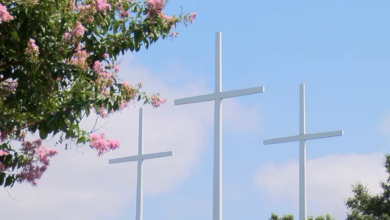Arrastre de caudas: A holy ritual that now only survives in Quito

Quito, Apr 13 (EFE).- The Metropolitan Cathedral of Quito on Wednesday welcomed hundreds of faithful for the traditional “Arrastre de caudas,” an ancient Catholic celebration of Holy Week now only seen in the Ecuadorian capital.
After it was suspended for the last two years due to the coronavirus pandemic, the ritual brought together hundreds of people, many of whom got into the cathedral, although the celebration was shown on a giant screen in the neighboring Independence Square.
The Roman celebration came from that which used to take place in Seville, Spain, and until a few years ago, in the Peruvian capital, but is now unique to only Quito.
It evokes the sacrifice of Jesus Christ on the cross and is a mourning ceremony in which a group of priests, dressed in “caudas” or long black cloaks held up by dark hoods, walk through the church in procession.
The religious arrive at the altar and prostrate themselves on the floor, while a priest waves a large black flag with a red cross through the air around the altar and then over the heads of the canons and the faithful in the first pews.
This celebration apparently arose from a funeral rite practiced by the Roman Army in honor of fallen generals, and which was later adopted by the Catholic Church in honor of the crucifixion and resurrection of Jesus Christ.
Alfredo Espinosa, archbishop of Quito, waved the flag on Wednesday over the faithful, including Quito Mayor Santiago Guarderas.
The ceremony also included the presentation of a relic that contains splinters of “the real cross” on which Christ died and which Espinosa raised to bless the faithful.
The service included a sermon by the archbishop, who asked that this ritual be seen not only as a custom or tradition, but as a representation of faith in which Jesus “carries our fears, our problems” and then “blesses us.”
He also called on the faithful to unite in the face of what he said are the dangers of society, such as violence, corruption, injustice and the scandals that have shaken the Church, but he also urged the faithful to listen to “the voice of God” – of tolerance, solidarity and forgiveness. EFE
fa/tw




